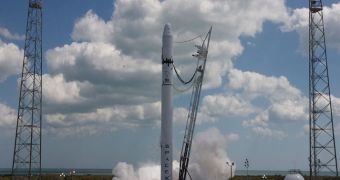Representatives of Hawthorne, California-based Space Exploration Technologies (SpaceX) announce that they plan to push ahead with their scheduled rocket launch this month. The company has yet to receive the final approval of a critical system, but officials say they are confident this will not delay the maiden flight of their new Falcon 9 delivery system. SpaceX is one of the two companies that stand to win most if Project Constellation is canceled, and NASA asked to sustain the private sector. But, in order for the company to get paid, it needs to demonstrate the viability of the Falcon 9 vehicle.
Under US President Barack Obama's 2011 budget proposal, NASA is to stop constructing the Orion Crew Exploration Vehicle and the ARES I and ARES V delivery systems. Instead, the agency will receive $6 billion over five years, to award to private contractors such as SpaceX and Virginia-based Orbital Sciences Corporation (OSC) to develop commercial spacecrafts for reaching low-Earth orbit (LEO) and the International Space Station (ISS).
Both corporations are fairly close to their goals, with SpaceX poised to launch this month, after numerous delays, and OSC being on track with its Cygnus vehicle. The latter has extensive experience in rocket launches, having been a major contractor for the US military for many years. In the case of the California-based company, the only thing holding the test flight of the Falcon 9 rocket back is a final approval, for its emergency destruct system. This mechanism will be in charge of completely ripping the spacecraft to pieces in case something goes wrong during take-off, and the debris threaten nearby populated areas.
“The test flights of Falcon 9 are very different from the future operational flights in their predictability, plus this is the first time we are launching from the Cape and the launch site itself is new,” explained for Space PayPal-co-founder Elon Musk, who is also the SpaceX CEO. According to an announcement by officials at the Patrick Air Force Base (PAFB), which is in charge of operations at the Cape Canaveral Air Force Station (CCAFS), the private corporation is currently targeting a May 23 launch date, although nothing specific has yet been pinned down.
“Falcon 9 will do a flight countdown attempt as soon as possible. Please note that I do not say 'launch,' as there is a good chance of seeing an anomaly (vehicle or ground side) on the first flight countdown that we have to investigate,” Musk revealed. In addition, it is clear now that the company needs to wait until after the planned May 14 launch date for space shuttle Atlantis, which is headed to the ISS. At least one or two days will pass after date, until the range becomes available, and all nearby tracking stations are reset.

 14 DAY TRIAL //
14 DAY TRIAL //